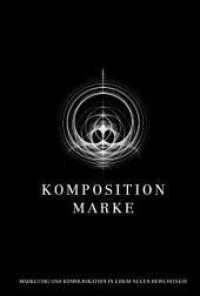- ホーム
- > 洋書
- > 英文書
- > Psychology
基本説明
Provides a basis for understanding the key theoretical and practical features of MBCT and how these differ from the other cognitive therapies.
Full Description
Mindfulness-Based Cognitive Therapy (MBCT) is increasingly used in therapeutic practice. It encourages clients to process experience without judgement as it arises, helping them to change their relationship with challenging thoughts and feelings, and accept that, even though difficult things may happen, it is possible to work with these in new ways.This book provides a basis for understanding the key theoretical and practical features of MBCT. Focusing on a mindfulness-based cognitive therapy programme that is offered in a group context to those who are vulnerable to depressive relapses, the text is divided into 30 distinctive features that characterise the approach.Mindfulness-Based Cognitive Therapy: Distinctive Features provides a concise, straightforward summary for professionals and trainees in the field. Its easy-to-use format will appeal to both experienced practitioners and newcomers with an interest in MBCT.
Contents
Acknowledgements. Williams, Foreword. Introduction. Part IDistinctive Theoretical Features of MBCT. An Integration of Mindfulness-Based Stress Reduction and Cognitive Behaviour Therapy. Underpinned by the Cognitive Theory of Vulnerability to Depression. Learning Skills to Reduce the Risk of Depressive Relapse. The Significance of Automatic Pilot. Modes of Mind: "Doing". Doing Mode in Action: The Effects of Rumination. Doing Mode in Action: The Effects of Experiential Avoidance. Reacting and Responding to Experience: Avoidance and Approach. Modes of Mind: "Being". Body Sensations - A Door into the Present. Ways of Approaching and Welcoming What Is. Developing a New Relationship with Experience. Awareness as a Container of Our Experience. Working with General and Specific Vulnerability. The MBCT Evidence Base. Part II: The Distinctive Practical Features of MBCT. Course Content and Structure. Session Themes. Assessment and Orientation. Eating a Raisin with Awareness. Body Scan Practice. Mindful Movement Practice. Sitting Meditation Practice. Three Minute Breathing Space. The Importance of Home Practice. Mindfulness Practice in Everyday Life. Pleasant and Unpleasant Events. Cognitive Behavioural Curriculum Elements. Investigating Experience. The MBCT Learning Environment. Teaching Through Embodiment.






